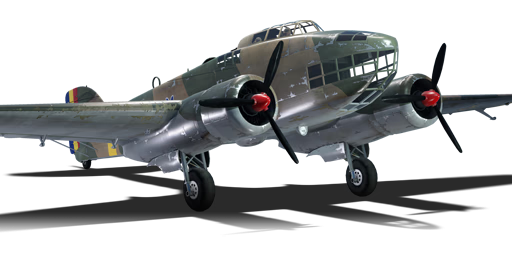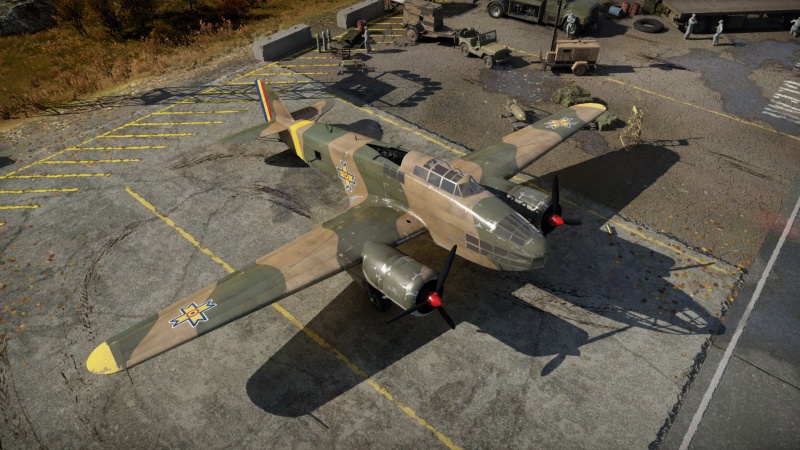S.M.79 B (Germany)
| This page is about the gift German bomber S.M.79 B (Germany). For other uses, see S.M.79 (Family). |
Contents
Description
The ▀S.M.79 Sparviero B (1936) is a gift rank II German bomber with a battle rating of 2.3 (AB/RB/SB). It has been in the game since the start of the Open Beta Test prior to Update 1.277 in the German aviation tree. In Update 1.69 "Regia Aeronautica", the S.M.79, as well as the other Italian planes in the German tree, were moved to the new Italian tree. This variant is painted in Romanian markings.
General info
Flight performance
| Characteristics | Max Speed (km/h at 3,700 m) |
Max altitude (metres) |
Turn time (seconds) |
Rate of climb (metres/second) |
Take-off run (metres) | |||
|---|---|---|---|---|---|---|---|---|
| AB | RB | AB | RB | AB | RB | |||
| Stock | 424 | 413 | 7500 | 36.6 | 37.3 | 3.0 | 3.9 | 580 |
| Upgraded | 467 | 445 | 33.5 | 35.0 | 10.1 | 5.9 | ||
Details
| Features | ||||
|---|---|---|---|---|
| Combat flaps | Take-off flaps | Landing flaps | Air brakes | Arrestor gear |
| ✓ | ✓ | ✓ | X | X |
| Limits | ||||||
|---|---|---|---|---|---|---|
| Wings (km/h) | Gear (km/h) | Flaps (km/h) | Max Static G | |||
| Combat | Take-off | Landing | + | - | ||
| 540 | 300 | 480 | 480 | 280 | ~3 | ~2 |
| Optimal velocities (km/h) | |||
|---|---|---|---|
| Ailerons | Rudder | Elevators | Radiator |
| < 260 | < 270 | < 270 | > 307 |
| Compressor (RB/SB) | ||
|---|---|---|
| Setting 1 | ||
| Optimal altitude | 100% Engine power | WEP Engine power |
| 3,300 m | 1,860 hp | 1,981 hp |
Survivability and armour
- No armour plating
- No armour glazing
- Fuel tanks located in fuselage and wing roots
Modifications and economy
Armaments
Suspended armament
The S.M.79 B (Germany) can be outfitted with the following ordnance:
- 12 x 50 kg GP 50 bombs (600 kg total)
- 12 x 100 kg GP 100T bombs (1,200 kg total)
- 5 x 250 kg GP 250 bombs (1,250 kg total)
- 2 x 500 kg GP 500 bombs (1,000 kg total)
Defensive armament
The S.M.79 B (Germany) is defended by:
- 1 x 12.7 mm Breda-SAFAT machine gun, dorsal turret (500 rpg)
- 1 x 12.7 mm Breda-SAFAT machine gun, ventral turret (500 rpg)
- 1 x 7.7 mm Lewis machine gun, 2 x beam turrets (500 rpg)
Usage in battles
Describe the tactics of playing in the aircraft, the features of using aircraft in a team and advice on tactics. Refrain from creating a "guide" - do not impose a single point of view, but instead, give the reader food for thought. Examine the most dangerous enemies and give recommendations on fighting them. If necessary, note the specifics of the game in different modes (AB, RB, SB).
Manual Engine Control
| MEC elements | ||||||
|---|---|---|---|---|---|---|
| Mixer | Pitch | Radiator | Supercharger | Turbocharger | ||
| Oil | Water | Type | ||||
| Not controllable | Controllable Not auto controlled |
Not controllable Not auto controlled |
Not controllable Not auto controlled |
Separate | Not controllable 1 gear |
Not controllable |
Pros and cons
Summarise and briefly evaluate the vehicle in terms of its characteristics and combat effectiveness. Mark its pros and cons in the bulleted list. Try not to use more than 6 points for each of the characteristics. Avoid using categorical definitions such as "bad", "good" and the like - use substitutions with softer forms such as "inadequate" and "effective".
Pros:
Cons:
History
During the pre-war period, SIAI actively tried to export the SM.79. Alessandro Marchetti argued that twin-engine planes, not three-engine, would be best for export. So, in spite of the Royal Italian Air Force's rejection of the SM.79B bomber project, he continued work in this area, developing a prototype.
The SM.79B had a completely redesigned nose section. A glazed cabin for the bombardier/navigator was placed where the centrally located engine used to be. The cockpit, to improve visibility, was moved forward and raised. The dorsal "hump" was moved farther back. Also, the area of the keel was increased slightly.
The plane was powered by two 14-cylinder star-shaped air-cooled Gnome-Rhone 14Kfs engines with 950 hp and a metal three-bladed variable-pitch SIAI propeller.
The engines were placed in elongated engine nacelles, and the aeroplane was given a more streamlined design, which fully compensated for the reduction in total thrust. The aircraft's defensive armament remained virtually unchanged: three heavy-calibre 12.7 mm Breda SAFAT machine guns, with 500 rounds per gun. One fixed machine gun was placed in the nose, and a second was located in the turret under the hump's sliding panel. The ventral gondola was now used only for a third gun, defending the plane from attacks from the lower rear.
The twin-engine SM.79B was offered to Belgium, Brazil, China, Czechoslovakia, Finland, Turkey, Yugoslavia, and the Soviet Union. However, no orders from any of these countries were ever received.
In the spring of 1937, Iraq ordered five SM.79Bs. The aircraft for Iraq were equipped with A.80 RC.41 engined with a takeoff power of 1030 hp. The third, fourth, and fifth SM.79Bs had larger cockpit windows. In early 1938, the Italian crews ferried the aircraft to the customer. All of these planes were eventually destroyed in 1941 during the rebellion in Iraq.
The largest order for the twin-engine SM.79B was placed by the country of Romania. In autumn of 1937, the Romanians requested 24 of the aircraft equipped with IAR K14-II engines with a power of 900 hp. (A licensed version of the Gnome-Rhone engine, produced in Romania.)
When compared with the Iraqi planes, the Romanian version had several differences: the mobile 7.92mm Browning FN machine gun with rotary magazine and 350 rounds of ammunition (mounted in the nose) and various equipment modifications. In 1938, these aircraft entered service with two squadrons of the Forţele Aeriene Regale ale Romaniei (Royal Romanian Air Force).
In-game description
Twin-engine SIAI Savoia-Marchetti SM.79B medium bomber.
During the pre-war period, SIAI actively tried to export the SM.79. Alessandro Marchetti argued that twin-engine planes, not three-engine, would be best for export. So, in spite of the Royal Italian Air Force's rejection of the SM.79B bomber project, he continued work in this area, developing a prototype.
The SM.79B had a completely redesigned nose section. A glazed cabin for the bombardier/navigator was placed where the centrally located engine used to be. The cockpit, to improve visibility, was moved forward and raised. The dorsal "hump" was moved farther back. Also, the area of the keel was increased slightly.
The plane was powered by two 14-cylinder star-shaped air-cooled Gnome-Rhone 14Kfs engines with 950 hp and a metal three-bladed variable-pitch SIAI propeller.
The engines were placed in elongated engine nacelles, and the aeroplane was given a more streamlined design, which fully compensated for the reduction in total thrust.
The aircraft's defensive armament remained virtually unchanged: three heavy-calibre 12.7 mm Breda SAFAT machine guns, with 500 rounds per gun. One fixed machine gun was placed in the nose, and a second was located in the turret under the hump's sliding panel. The ventral gondola was now used only for a third gun, defending the plane from attacks from the lower rear.
The twin-engine SM.79B was offered to Belgium, Brazil, China, Czechoslovakia, Finland, Turkey, Yugoslavia, and the Soviet Union. However, no orders from any of these countries were ever received.
In the spring of 1937, Iraq ordered five SM.79Bs. The aircraft for Iraq were equipped with A.80 RC.41 engined with a takeoff power of 1030 hp. The third, fourth, and fifth SM.79Bs had larger cockpit windows. In early 1938, the Italian crews ferried the aircraft to the customer. All of these planes were eventually destroyed in 1941 during the rebellion in Iraq.
The largest order for the twin-engine SM.79B was placed by the country of Romania. In autumn of 1937, the Romanians requested 24 of the aircraft equipped with IAR K14-II engines with a power of 900 hp. (A licensed version of the Gnome-Rhone engine, produced in Romania.)
When compared with the Iraqi planes, the Romanian version had several differences: the mobile 7.92mm Browning FN machine gun with rotary magazine and 350 rounds of ammunition (mounted in the nose) and various equipment modifications. In 1938, these aircraft entered service with two squadrons of the Forţele Aeriene Regale ale Romaniei (Royal Romanian Air Force).
Media
Excellent additions to the article would be video guides, screenshots from the game, and photos.
See also
Links to the articles on the War Thunder Wiki that you think will be useful for the reader, for example:
- reference to the series of the aircraft;
- links to approximate analogues of other nations and research trees.
External links
| Savoia-Marchetti | |
|---|---|
| Bombers | S.M.79 serie 1 · S.M.79 serie 8 · S.M.79 AS · S.M.79 bis/T.M |
| S.81 | |
| Attackers | SM.91 · SM.92 |
| Export | S.M.79 B |
| Captured | ▀S.M.79 serie 1 · ▀S.M.79 serie 4 · ▀S.M.79 serie 8 |
| ▀S.M.79 AS · ▀S.M.79 bis/N · ▀S.M.79 bis/T.M · ▀S.M.79 B | |
| Germany bombers | |
|---|---|
| Arado | Ar 196 A-3 |
| Blohm & Voss | BV 138 C-1 · BV 238 |
| Dornier | Do 17 E-1 · Do 17 Z-2 · Do 217 E-2 · Do 217 E-4 · Do 217 K-1 · Do 217 M-1 |
| Focke-Wulf | Fw 189 A-1 · Fw 200 C-1 |
| Henschel | Hs 123 A-1 |
| Heinkel | He 111 H-3 · He 111 H-6 · He 111 H-16 · He 115 C-1 · He 177 A-3 · He 177 A-5 |
| Junkers | Ju 87 B-2 · Ju 87 R-2 · Ju 87 R-2 Libya · Ju 87 D-3 · Ju 87 D-5 · Ju 88 A-1 · Ju 88 A-4 · Ju 188 A-2 · Ju 288 C |
| Messerschmitt | Me 264 |
| Savoia-Marchetti | ▀S.M.79 serie 1 · ▀S.M.79 B · ▀S.M.79 serie 4 · ▀S.M.79 serie 8 |
| ▀S.M.79 AS · ▀S.M.79 bis/N · ▀S.M.79 bis/T.M | |
| Trophies | ▀Wellington Mk Ic |





